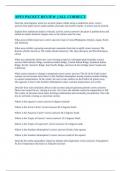Exam (elaborations)
APES PACKET REVIEW || ALL CORRECT.
- Course
- Institution
Describe what happens when two tectonic plates collide along a subduction zone. correct answers One plates moves under another and sinks into Earth's mantle. A trench may be formed Explain how subduction leads to volcanic activity correct answers One plate is pushed down and melted as molten mat...
[Show more]



